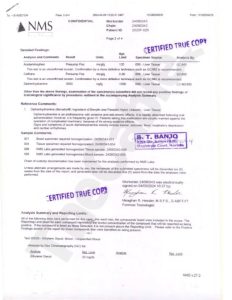The autopsy conducted on the body of late singer Ilerioluwa Aloba aka Mohbad, at the Lagos State University Teaching Hospital (LASUTH) has revealed the possible cause of his death.
According to the Cable, samples of the gastric content, blood, bone marrow, liver, kidney, and lung of the late singer were retrieved for a toxicology test. The anatomical and pathological findings revealed that Mohbad had an injury on his right forearm and his body was exhumed with moderate to severe decomposition.
The autopsy also showed that “no significant gross finding” could be attributed to the singer’s death.
The toxicology “revealed the positive finding of Diphenhydramine, an anti-histamine; however, this concentration was not in a fatal or lethal range”.
Anti-histamines are medicines used to treat symptoms of allergies. They are also used to treat a variety of other conditions such as stomach problems, colds, and anxiety, among others.

The report mentioned that the cause of death could not be ascertained. It however, added that there is a possibility of drug reaction in view of any significant post-mortem and toxicology findings.
“It is noteworthy that the body neither had an autopsy nor embalmed prior to interment on the second day,” the report states.
“Following the Order for Exhumation, the body was exhumed on 21/09/2023 (8 days after the burial).
Autopsy revealed moderate to marked decomposition of organs. Apart from the superficial injury on the right forearm, no significant gross finding could be attributed to death.
Against this background, samples were taken for toxicology. This is to determine if there was any anaphylactic reaction, substances of abuse, overdosage or common household poisoning. Toxicology revealed positive findings of Diphenhydramine, an anti-histamine; however, this concentration was not in a fatal or lethal range. The other analytics were unremarkable.
“In determining fatal anaphylactic shock, blood sample needs to be taken as quickly as possible.
Unfortunately, this was prevented or made impossible by the burial of the deceased on the second day. In the light of the foregoing, cause of death could not be ascertained.
However, the possibility of a fatal anaphylactic shock (drug reaction) could be considered in view of the absence of any significant post mortem and toxicology findings.” he said.
![]()




























































